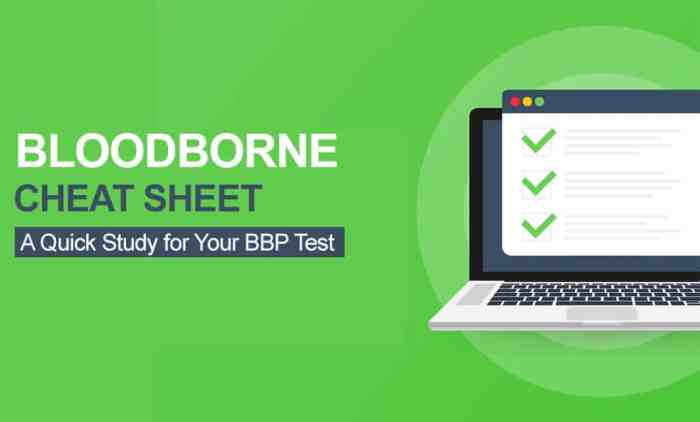Answer key bloodborne pathogens quiz answers – Unveiling the Answer Key for Bloodborne Pathogens Quiz, this comprehensive guide illuminates the intricacies of bloodborne pathogens, empowering healthcare professionals with the knowledge to navigate potential hazards effectively. By delving into the key concepts, standard precautions, and post-exposure management protocols, this resource equips readers with a profound understanding of bloodborne pathogens, safeguarding both themselves and the communities they serve.
Through a meticulously crafted quiz, this answer key serves as an invaluable tool for assessing knowledge and identifying areas for improvement. Its detailed explanations provide a roadmap for enhancing bloodborne pathogens education and training, fostering a culture of safety and preparedness within healthcare settings.
Bloodborne Pathogens Quiz Overview: Answer Key Bloodborne Pathogens Quiz Answers
A bloodborne pathogens quiz is a tool used to assess an individual’s knowledge and understanding of bloodborne pathogens and the associated risks, precautions, and prevention measures.
The target audience for a bloodborne pathogens quiz includes healthcare workers, laboratory personnel, first responders, and anyone else who may be exposed to blood or bodily fluids.
Understanding bloodborne pathogens is crucial for preventing transmission and protecting both individuals and the public health.
Key Concepts in Bloodborne Pathogens
Definition of Bloodborne Pathogens
Bloodborne pathogens are microorganisms that can be transmitted through contact with infected blood or bodily fluids.
Common Bloodborne Pathogens and Transmission Methods
- Hepatitis B virus (HBV) – transmitted through contact with infected blood or bodily fluids
- Hepatitis C virus (HCV) – transmitted through contact with infected blood
- Human immunodeficiency virus (HIV) – transmitted through contact with infected blood, semen, vaginal fluids, or breast milk
Risks Associated with Exposure to Bloodborne Pathogens
- Acute or chronic infection
- Liver damage
- Cancer
- Death
Standard Precautions and Prevention Measures
Standard Precautions for Handling Blood and Bodily Fluids
Standard precautions assume that all blood and bodily fluids are potentially infectious and require appropriate handling.
- Wear gloves, gowns, and masks when handling blood or bodily fluids
- Wash hands thoroughly before and after handling blood or bodily fluids
- Dispose of contaminated materials properly
Use of Personal Protective Equipment (PPE) to Prevent Exposure
PPE, such as gloves, gowns, masks, and eye protection, creates a barrier between the individual and potential exposure to bloodborne pathogens.
Importance of Proper Hand Hygiene and Disinfection Practices
Proper hand hygiene and disinfection practices, including frequent hand washing and the use of alcohol-based hand sanitizers, help reduce the risk of transmission of bloodborne pathogens.
Post-Exposure Management

Steps to Follow in the Event of an Exposure to Bloodborne Pathogens, Answer key bloodborne pathogens quiz answers
- Wash the exposed area with soap and water
- Report the exposure to a healthcare professional immediately
- Follow healthcare provider’s instructions for testing and treatment
Role of Healthcare Professionals in Post-Exposure Management
Healthcare professionals play a crucial role in post-exposure management, providing testing, treatment, and counseling to individuals exposed to bloodborne pathogens.
Importance of Reporting and Documenting Exposures
Reporting and documenting exposures helps track the incidence of bloodborne pathogen exposures and identify trends, which can inform prevention and control measures.
FAQ Compilation
What is the purpose of a bloodborne pathogens quiz?
A bloodborne pathogens quiz assesses healthcare professionals’ knowledge and understanding of bloodborne pathogens, their transmission methods, and the standard precautions necessary to prevent exposure.
Who is the target audience for a bloodborne pathogens quiz?
Healthcare professionals, including nurses, doctors, laboratory technicians, and anyone who may come into contact with blood or bodily fluids.
Why is it important to understand bloodborne pathogens?
Bloodborne pathogens can cause serious and potentially fatal infections, making it crucial for healthcare professionals to be aware of their risks and the measures necessary to protect themselves and others.